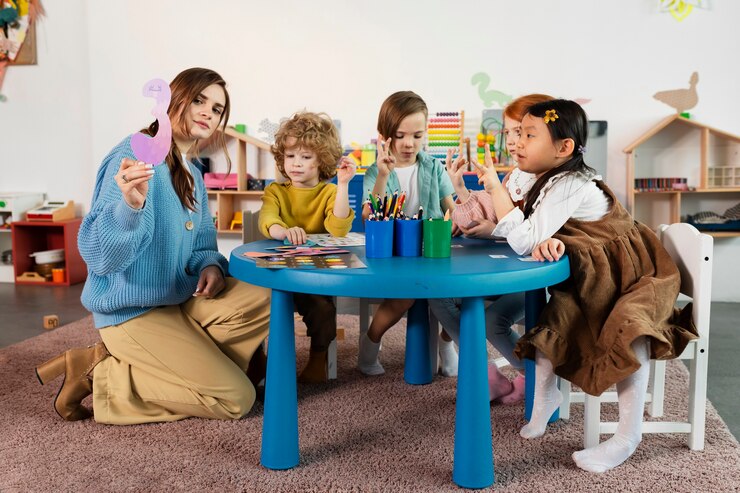Introduction : Preschool Education
Play-based learning is the foundation of early childhood education and has proven to be a powerful way to enhance a child’s cognitive, social, and emotional development. In preschool, play isn’t just fun—it’s a critical part of learning. In this blog, we’ll explore why play-based learning is essential and how it shapes a child’s educational journey.
1. Cognitive Development Through Play
Play stimulates brain development, laying the foundation for a child’s future academic success.
- Problem-Solving Skills: When children engage in role-playing games or build with blocks, they are learning how to solve problems by exploring cause and effect. This helps develop critical thinking and decision-making skills that are essential for later life.
- Enhancing Memory and Attention: Games that involve memory, such as matching games or Simon Says, improve a child’s ability to focus and retain information, which is beneficial for tasks like reading and math in the future.
2. Social and Emotional Learning in Play-Based Education
In preschool, play teaches children how to navigate social situations and manage their emotions.
- Learning to Share and Cooperate: Play often requires children to work together, which helps them learn the importance of sharing, taking turns, and cooperating with others.
- Emotional Regulation: Through imaginative play, children often act out real-life situations that help them process emotions like frustration, joy, and empathy. This is key for emotional intelligence development.
3. The Role of Teachers in Facilitating Play
Teachers play an active role in encouraging purposeful play that supports educational goals.
- Guided Play: Teachers can set up environments where children are subtly guided to explore educational themes, such as counting toys, identifying shapes, or creating stories.
- Observation: Teachers also observe children’s play to gain insight into their developmental progress and areas where they may need additional support, whether in language development, motor skills, or social interaction.
4. Incorporating Play into Daily Learning
Preschools that incorporate play into daily activities help children feel more engaged and eager to learn.
- Interactive Learning: Many preschool curriculums include games that teach math, reading, and science concepts in a playful way. This makes learning enjoyable and helps children internalize these concepts more effectively.
- Hands-On Activities: Activities like building structures, playing in sand, or using water tables encourage tactile learning, making abstract concepts feel more tangible and easier to understand.
Conclusion
Play-based learning is not just a fun part of preschool education—it is an essential component that promotes cognitive, social, and emotional growth. Through play, children develop the foundational skills they need to succeed academically and personally. As parents and educators, it’s important to recognize the value of play and continue to foster it in early learning environments.


parentinghug.com